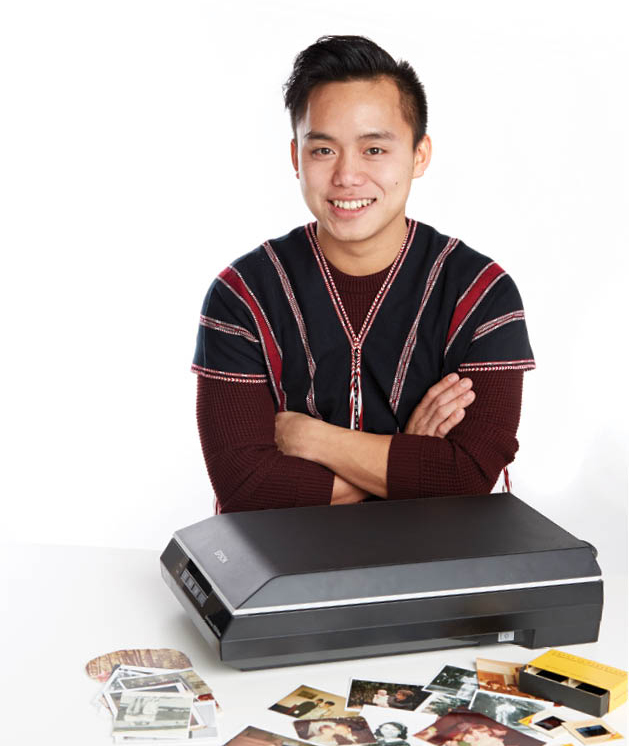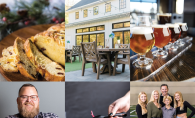Like many Woodbury families, Juli Servatius and her husband were at a bit of a loss when they became empty nesters with their kids off at school. “Was I going to go back to work full-time,” Servatius says, “or do something different?”
They opted for something different—by starting a company specifically to help Karen refugees in Minnesota gain technology-based employment experience. Scan More Pix, a photo scanning company, was launched in 2014, but the idea can be traced back to 2007, when the Servatius’s church group, Five Oaks Church, sponsored a family that had fled from Burma.
“We met them at the airport. Five Oaks Church furnished their apartment and put food in the refrigerator, and also connected them with a medical provider,” Servatius says. It was during this experience that they realized the struggles Karen people face once they escape war-torn Burma. “We realized that the unemployment in their community is really high. It’s four to five times what the average Minnesota unemployment rate is,” she says. And “it’s because of all the things that you would think of—it’s language, it’s transportation, it’s lack of education.”
Older Karen in the community often find jobs sorting vegetables or in meat packing, while younger individuals might be able to get certified as a personal care assistant, but there aren’t many lifelong career opportunities for those wanting to enter the technology or business field. “So my husband and I had a very keen interest in helping them to have white collar job experience, technology-based job experience,” she says. They had just had their own old photos scanned when they realized, “Yeah, this could be a legitimate business.”
“It was just dipping a toe in the water and then running with it,” Servatius says. Servatius and Scan More Pix employees such as Ta Lay Htoo started by just scanning photos, and then found that customers needed their slides scanned, followed by negatives, which can offer a clearer result than scanning from a printed photo. They also offer file transfers —VHS tapes, cassettes—all of which are going digital.
Many of her customers are people wanting to cut down on the amount of space old photo albums are taking up, and some are people handling estates. “When the last parent dies, the question is ‘Who gets their pictures?’” she says. With scanning, every one can be shared.
Local resident Dee Clark found Scan More Pix online when searching for a way to share the inherited pictures, newspaper articles and documents her parents had saved for three quarters of a century. “[I] stopped when I saw the good work Juli does with refugees from Burma,” she says. Once reaching out, it was “easy peasy, and Juli was such a delight to work with. Her worker even put the stuff in chronological order as best he could (which was better than I would have).”
Positive feedback is a blessing in any business, but for Servatius, it means she’s getting closer to accomplishing the company’s goal, which is “to eventually turn over the business to one or two of the scan technicians.” Business ownership is lacking in the Karen community, she says, and the ownership there generally does business within the Karen community only. “But to be able to have a business that faces the larger Minnesota community … it only increases cultural competency to be able to interact in a business with people from all the cultures around you.”
The Karen Refugee Community
St. Paul has one of the larger Karen refugee communities, which is part of what spurred Juli Servatius’ desire to help boost their resumes. “The Karen were forced from their communities in the Karen state in Burma because of civil war and fled, like the Hmong before them, into refugee camps in Thailand,” she explains. “And when you live in a refugee camp, you’re not allowed to work.”
There are roughly 4,000 Karen refugees in Minnesota, and they left Burma, or Myanmar, to escape extreme violence. Scan technician Ta Lay Htoo is one of them. At the age of 10 he left with his father and siblings. “The reason we moved to Thailand was my mother passed away, and it was a tough life in Burma,” he says. He and his siblings couldn’t go to school, for multiple reasons, so his father decided Thailand was their best chance at an education. “It wasn’t a safe place to live anymore,” Htoo says. “So they moved to a refugee camp where Htoo stayed for almost seven years before moving to St. Paul in 2011. One brother and one sister remain in Thailand.
Minnesota had its challenges, too, Htoo says. “It was hard at first; I didn’t know the language.” But now, he’s been working for Scan More Pix for over a year and is able to make money for college, where he plans on being an accounting major. And the resume-builder will prepare him for an accounting job.
“He’ll be able to say he’s done accounts payable and accounts receivable; Ta Lay does most of our customer correspondence,” Servatius says. “All of those skills that you would need in a business is what he can do.”

Scan technician Ta Lay Htoo is a Karen refugee who left his home country at the age of 10 with his father and siblings. Htoo moved to a refugee camp where he stayed for almost seven years before moving to St. Paul in 2011. One brother and one sister remain in Thailand.
At Scan More Pix, Ta Lay is gaining practical business skills including accounts payable and receivable, and customer service.









